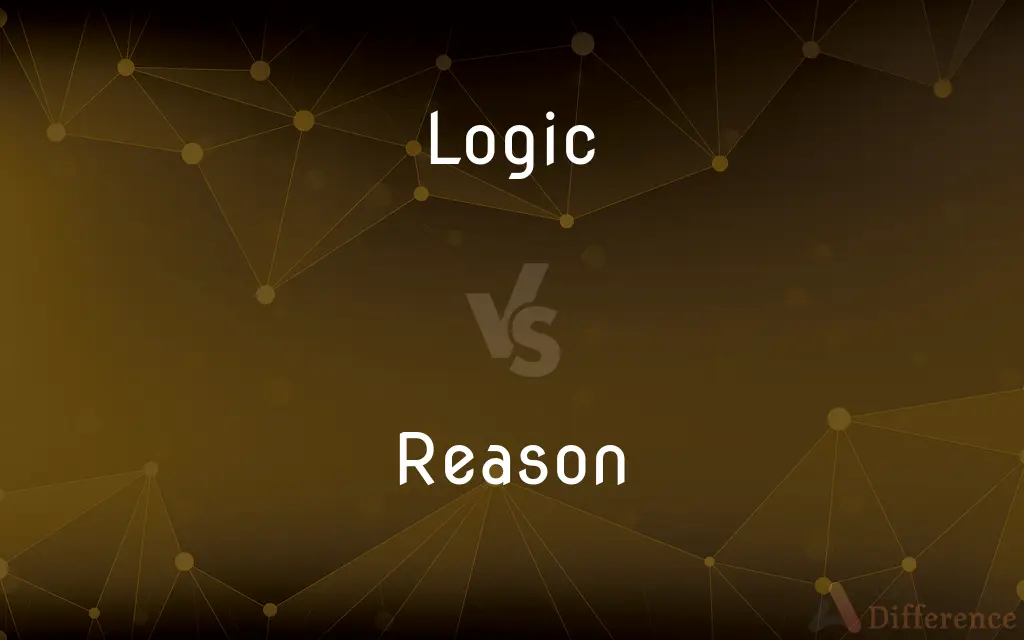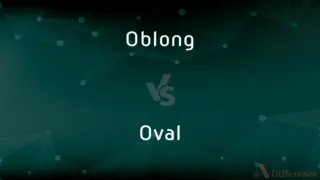Logic vs. Reason — What's the Difference?
Edited by Tayyaba Rehman — By Fiza Rafique — Updated on September 21, 2023
Logic is the systematic process of reasoning according to strict principles, often used to evaluate arguments. Reason is the mental faculty of making judgments based on logic or facts. Logic is a tool used within the broader capacity for reason.

Difference Between Logic and Reason
Table of Contents
ADVERTISEMENT
Key Differences
Logic is a specific method of reasoning, typically formalized, and follows a set of principles such as deduction or induction. It is often codified in the form of arguments that are evaluated for validity or soundness. Reason, on the other hand, is a broader cognitive ability that allows individuals to make judgments, often utilizing logic but also encompassing emotion, intuition, and other forms of understanding.
In academia, logic is a discipline that can be studied independently, with its own set of axioms and structures, such as syllogisms or propositional calculus. Reason is not typically an independent field of study but is discussed as a part of philosophy, psychology, and other disciplines. It covers not just logical reasoning but also ethical reasoning, emotional reasoning, and even instinctive reasoning.
When it comes to everyday use, logic is often applied in structured environments such as scientific research, programming, and debate. Reason, by contrast, is employed in a wide range of settings, from solving everyday problems to making ethical decisions. The application of logic is generally more rigid, while reason can be more flexible.
In a sense, logic can be seen as a subset of reason. One can be logical without being reasonable if the premises upon which the logic is based are flawed or irrelevant. For example, a logically sound argument may be built upon a false premise, making it unreasonable in the context.
Comparison Chart
Scope
Narrow, based on formal rules
Broad, includes various faculties
ADVERTISEMENT
Academic Discipline
Independent field
Part of multiple disciplines
Everyday Use
Structured environments
Varied settings
Flexibility
Generally rigid
Flexible
Relationship
Subset of reason
Encompasses logic and more
Compare with Definitions
Logic
A system of principles for evaluation.
The logic of the computer program is complex.
Reason
Logical and rational thought.
He approached the problem with reason.
Logic
Deductive reasoning.
The logic led us to the inevitable conclusion.
Reason
The power of comprehending and analyzing.
She lost her reason after the traumatic event.
Logic
Sound judgment.
She questioned the logic behind his decision.
Reason
Reason is the capacity of consciously applying logic to seek truth and draw conclusions from new or existing information. It is closely associated with such characteristically human activities as philosophy, science, language, mathematics, and art, and is normally considered to be a distinguishing ability possessed by humans.
Logic
Logic (from Greek: λογική, logikḗ, 'possessed of reason, intellectual, dialectical, argumentative') is the systematic study of valid rules of inference, i.e. the relations that lead to the acceptance of one proposition (the conclusion) on the basis of a set of other propositions (premises).
Reason
The basis or motive for an action, decision, or conviction
There are good reasons to learn a foreign language. See Usage Notes at because, why.
Logic
The study of principles of reasoning, especially of the structure of propositions as distinguished from their content, and of method and validity in deductive reasoning.
Reason
A declaration made to explain or justify action, decision, or conviction
What reasons did she give for leaving?.
Logic
A system of reasoning
Aristotle's logic.
Reason
A fact or cause that explains why something exists or has occurred
The reason for the building's collapse is unknown.
Logic
A mode of reasoning
By that logic, we should sell the company tomorrow.
Reason
(Logic) A premise, usually the minor premise, of an argument.
Logic
The formal, guiding principles of a discipline, school, or science.
Reason
The capacity for logical, rational, and analytic thought; intelligence
"Most of us would like to believe that when we say something is right or wrong, we are using our powers of reason alone" (Carl Zimmer).
Logic
Valid reasoning
Your paper lacks the logic to prove your thesis.
Reason
The limit of what is reasonable
"It is a curious thing that, when a man hates or loves beyond reason, he is ready to go beyond reason to gratify his feelings" (Rudyard Kipling).
Logic
The relationship between elements and between an element and the whole in a set of objects, individuals, principles, or events
There's a certain logic to the motion of rush-hour traffic.
Reason
A normal mental state; sanity
He has lost his reason.
Logic
The nonarithmetic operations performed by a computer, such as sorting, comparing, and matching, that involve yes-no decisions.
Reason
To determine or conclude by logical thinking
The doctor reasoned that the patient had a virus.
Logic
Computer circuitry.
Reason
To persuade or dissuade (someone) with reasons
"You boast ... of having reasoned him out of his absurd romance" (William Makepeace Thackeray).
Logic
Graphic representation of computer circuitry.
Reason
To use the faculty of reason; think logically
What would lead you to reason so?.
Logic
Logical
Reason
To talk or argue logically and persuasively
Tried to reason with her son to eat a good breakfast.
Logic
(uncountable) A method of human thought that involves thinking in a linear, step-by-step manner about how a problem can be solved. Logic is the basis of many principles including the scientific method.
Reason
(Obsolete) To engage in conversation or discussion.
Logic
The study of the principles and criteria of valid inference and demonstration.
Reason
A cause:
Logic
The mathematical study of relationships between rigorously defined concepts and of mathematical proof of statements.
Reason
That which causes something: an efficient cause, a proximate cause.
The reason this tree fell is that it had rotted.
Logic
A formal or informal language together with a deductive system or a model-theoretic semantics.
Reason
A motive for an action or a determination.
The reason I robbed the bank was that I needed the money.
If you don't give me a reason to go with you, I won't.
Logic
(uncountable) Any system of thought, whether rigorous and productive or not, especially one associated with a particular person.
It's hard to work out his system of logic.
Reason
An excuse: a thought or a consideration offered in support of a determination or an opinion; that which is offered or accepted as an explanation.
Logic
(uncountable) The part of a system (usually electronic) that performs the boolean logic operations, short for logic gates or logic circuit.
Fred is designing the logic for the new controller.
Reason
(logic) A premise placed after its conclusion.
Logic
To engage in excessive or inappropriate application of logic.
Reason
(uncountable) Rational thinking (or the capacity for it); the cognitive faculties, collectively, of conception, judgment, deduction and intuition.
Mankind should develop reason above all other virtues.
Logic
(transitive) To apply logical reasoning to.
Reason
(obsolete) Something reasonable, in accordance with thought; justice.
Logic
(transitive) To overcome by logical argument.
Reason
Ratio; proportion.
Logic
The science or art of exact reasoning, or of pure and formal thought, or of the laws according to which the processes of pure thinking should be conducted; the science of the formation and application of general notions; the science of generalization, judgment, classification, reasoning, and systematic arrangement; the science of correct reasoning.
Logic is the science of the laws of thought, as thought; that is, of the necessary conditions to which thought, considered in itself, is subject.
Reason
(intransitive) To deduce or come to a conclusion by being rational
Logic
A treatise on logic; as, Mill's Logic.
Reason
(intransitive) To perform a process of deduction or of induction, in order to convince or to confute; to argue.
Logic
Correct reasoning; as, I can't see any logic in his argument; also, sound judgment; as, the logic of surrender was uncontestable.
Reason
To converse; to compare opinions.
Logic
The path of reasoning used in any specific argument; as, his logic was irrefutable.
Reason
(ambitransitive) To arrange and present the reasons for or against; to examine or discuss by arguments; to debate or discuss.
I reasoned the matter with my friend.
Logic
A function of an electrical circuit (called a gate) that mimics certain elementary binary logical operations on electrical signals, such as AND, OR, or NOT; as, a logic circuit; the arithmetic and logic unit.
Reason
To support with reasons, as a request.
Logic
The branch of philosophy that analyzes inference
Reason
(transitive) To persuade by reasoning or argument.
To reason one into a belief; to reason one out of his plan
Logic
Reasoned and reasonable judgment;
It made a certain kind of logic
Reason
To overcome or conquer by adducing reasons.
To reason down a passion
Logic
The principles that guide reasoning within a given field or situation;
Economic logic requires it
By the logic of war
Reason
To find by logical process; to explain or justify by reason or argument.
To reason out the causes of the librations of the moon
Logic
A system of reasoning
Reason
A thought or a consideration offered in support of a determination or an opinion; a just ground for a conclusion or an action; that which is offered or accepted as an explanation; the efficient cause of an occurrence or a phenomenon; a motive for an action or a determination; proof, more or less decisive, for an opinion or a conclusion; principle; efficient cause; final cause; ground of argument.
I'll give him reasons for it.
The reason of the motion of the balance in a wheel watch is by the motion of the next wheel.
This reason did the ancient fathers render, why the church was called "catholic."
Virtue and vice are not arbitrary things; but there is a natural and eternal reason for that goodness and virtue, and against vice and wickedness.
Logic
Formal reasoning based on rules.
His logic in solving the puzzle was impeccable.
Reason
The faculty or capacity of the human mind by which it is distinguished from the intelligence of the inferior animals; the higher as distinguished from the lower cognitive faculties, sense, imagination, and memory, and in contrast to the feelings and desires. Reason comprises conception, judgment, reasoning, and the intuitional faculty. Specifically, it is the intuitional faculty, or the faculty of first truths, as distinguished from the understanding, which is called the discursive or ratiocinative faculty.
We have no other faculties of perceiving or knowing anything divine or human, but by our five senses and our reason.
In common and popular discourse, reason denotes that power by which we distinguish truth from falsehood, and right from wrong, and by which we are enabled to combine means for the attainment of particular ends.
Reason is used sometimes to express the whole of those powers which elevate man above the brutes, and constitute his rational nature, more especially, perhaps, his intellectual powers; sometimes to express the power of deduction or argumentation.
By the pure reason I mean the power by which we become possessed of principles.
The sense perceives; the understanding, in its own peculiar operation, conceives; the reason, or rationalized understanding, comprehends.
Logic
The structure that underlies a physical or theoretical system.
The logic of the experiment was straightforward.
Reason
Due exercise of the reasoning faculty; accordance with, or that which is accordant with and ratified by, the mind rightly exercised; right intellectual judgment; clear and fair deductions from true principles; that which is dictated or supported by the common sense of mankind; right conduct; right; propriety; justice.
I was promised, on a time,To have reason for my rhyme.
But law in a free nation hath been ever public reason; the enacted reason of a parliament, which he denying to enact, denies to govern us by that which ought to be our law; interposing his own private reason, which to us is no law.
The most probable way of bringing France to reason would be by the making an attempt on the Spanish West Indies.
Reason
Ratio; proportion.
When anything is proved by as good arguments as a thing of that kind is capable of, we ought not, in reason, to doubt of its existence.
Yet it were great reason, that those that have children should have greatest care of future times.
Reason
To exercise the rational faculty; to deduce inferences from premises; to perform the process of deduction or of induction; to ratiocinate; to reach conclusions by a systematic comparison of facts.
Reason
Hence: To carry on a process of deduction or of induction, in order to convince or to confute; to formulate and set forth propositions and the inferences from them; to argue.
Stand still, that I may reason with you, before the Lord, of all the righteous acts of the Lord.
Reason
To converse; to compare opinions.
Reason
To arrange and present the reasons for or against; to examine or discuss by arguments; to debate or discuss; as, I reasoned the matter with my friend.
When they are clearly discovered, well digested, and well reasoned in every part, there is beauty in such a theory.
Reason
To support with reasons, as a request.
Reason
To persuade by reasoning or argument; as, to reason one into a belief; to reason one out of his plan.
Men that will not be reasoned into their senses.
Reason
To overcome or conquer by adducing reasons; - with down; as, to reason down a passion.
Reason
To find by logical processes; to explain or justify by reason or argument; - usually with out; as, to reason out the causes of the librations of the moon.
Reason
A rational motive for a belief or action;
The reason that war was declared
The grounds for their declaration
Reason
An explanation of the cause of some phenomenon;
The reason a steady state was never reached was that the back pressure built up too slowly
Reason
The capacity for rational thought or inference or discrimination;
We are told that man is endowed with reason and capable of distinguishing good from evil
Reason
The state of having good sense and sound judgment;
His rationality may have been impaired
He had to rely less on reason than on rousing their emotions
Reason
A justification for something existing or happening;
He had no cause to complain
They had good reason to rejoice
Reason
A fact that logically justifies some premise or conclusion;
There is reason to believe he is lying
Reason
Decide by reasoning; draw or come to a conclusion;
We reasoned that it was cheaper to rent than to buy a house
Reason
Present reasons and arguments
Reason
Think logically;
The children must learn to reason
Reason
The mental faculty of making judgments.
He had good reason to be cautious.
Reason
A basis or cause for a belief or action.
The reason for the accident was unclear.
Reason
Justification for an action or event.
What's your reason for being late?
Common Curiosities
Can reason be illogical?
Yes, reason can include emotional or intuitive judgments.
Is logic always reasonable?
No, logic can be flawed if based on incorrect or irrelevant premises.
Is logic a field of study?
Yes, logic is studied as an independent academic discipline.
Can logic exist without reason?
Logic is a subset of reason and generally does not exist independently.
What is reason?
Reason is the mental ability to make judgments, often using logic.
Are logic and reason the same?
No, logic is a tool used within the broader mental faculty of reason.
What is logic?
Logic is a formalized method of reasoning based on a set of principles.
Can reason exist without logic?
Yes, reason can use emotional or ethical faculties in addition to logic.
Is reason always objective?
No, reason can include subjective elements like emotion.
Is reason a field of study?
No, reason is discussed within multiple fields like philosophy and psychology.
Can logic be emotional?
Logic aims to eliminate emotion in favor of rational principles.
What's an example of using logic in everyday life?
Logic is often used in problem-solving, such as mathematical puzzles.
Is logic always objective?
Logic aims to be objective but can be flawed based on its premises.
What's an example of using reason in everyday life?
Reason is used in making decisions, such as choosing a career path.
Can reason be emotional?
Yes, reason can include emotional reasoning, especially in ethical or interpersonal contexts.
Share Your Discovery

Previous Comparison
Sound vs. Bay
Next Comparison
Oblong vs. OvalAuthor Spotlight
Written by
Fiza RafiqueFiza Rafique is a skilled content writer at AskDifference.com, where she meticulously refines and enhances written pieces. Drawing from her vast editorial expertise, Fiza ensures clarity, accuracy, and precision in every article. Passionate about language, she continually seeks to elevate the quality of content for readers worldwide.
Edited by
Tayyaba RehmanTayyaba Rehman is a distinguished writer, currently serving as a primary contributor to askdifference.com. As a researcher in semantics and etymology, Tayyaba's passion for the complexity of languages and their distinctions has found a perfect home on the platform. Tayyaba delves into the intricacies of language, distinguishing between commonly confused words and phrases, thereby providing clarity for readers worldwide.














































